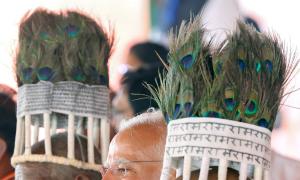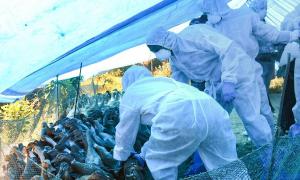Vultures are on the verge of extinction in India with nearly 98 per cent of the birds having died in the past 16 years due to the use of an anti-inflammatory drug 'diclofenac' on livestock, scientists have warned.
"Ninety-nine percent of the 40 million vultures counted in 1992 have died by 2007 due to the use of 'diclofenac' given to the cattle to relieve pain and inflammation by veterinarians," director of Bombay Natural History Society, Asad Rehmani, told reporters on Friday in Guwahati.
According to the scientist, the residue of the drug in dead animals which the vultures feed on causes kidney failure of the birds.
The BNHS has conducted nationwide surveys and is working to save the birds from extinction. Of the three affected species, the oriental white-rumped vultures declined by 99.9 per cent, long-billed and slender-billed vultures by 96.8 per cent, Rehmani said, adding the population of the oriental white-rumped was at 43.9 percent in 2000 to 2007 period.
Survival of vultures, which prevent the spread of disease by eating animal carcass, is important to the ecosystem. The birds also prevent proliferation of dogs which become ferocious after feeding on dead animals and spread rabies.
The central government had banned 'diclofenec' in August 2006 on a BNHS initiative, but because of the drug's two- to three-year shelflife, it still continues to be used though a safe alternative 'meloxicam' is available in the market.
Besides banning the drug, Rehman said a conservation breeding programme was the only way to save the species from extinction. Three such breeding centres have already opened across the country, including one in Assam, near Guwahati.
The Assam forest department, in association with BNHS, has established a conservation breeding centre at Rani near Guwahati with 14 birds, said chief conservator of forests (wildlife), Chandra Malakar.
The objective of the breeding centres was to establish a founder population of 25 pairs each of the12 species of vultures and to produce at least 200 birds of each species to be reintroduced in the wild in 15 years.
The three aviaries were designed to provide a natural nest-like environment for the successful rearing of nestlings. The nestlings and juveniles collected for the programme are housed at the Rani facility on five acres of the Jorasal reserve forest, away from the cacophony of the city.
The first white-backed vulture was brought to the centre in June 2007 and now there are 14 birds, including eight white-backed and six slender-billed vultures. In addition to these, there are also four one-year-old birds and 10 others collected as nestlings from across Assam in 2008.








More from rediff